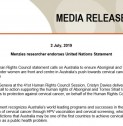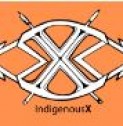Associate Professor Lisa Whop
Honourary Research fellow
Qualifications:
PhD of Epidemiology, Charles Darwin University, 2016; Master of Applied Epidemiology, Australian National University, 2011; Bachelor of Medical Science, Queensland University of Technology, 2008.
Location:
Biography:
Lisa’s key motivation is improving the health of Aboriginal and Torres Strait Islander people.
Her research to date has focused on improving outcomes for Aboriginal and Torres Strait Islander people with cancer.
Her PhD project was the first population-based study in Australia to investigate Indigenous women’s participation in cervical screening and its given consequences.
Lisa is also an Associate Professor, National Centre for Epidemiology and Population Health, College of Health & Medicine at the Australian National University.
- National Indigenous Cervical Screening Project
- Yarning with our mob about HPV vaccination uptake
- TACTICS: Targeted Approach to Improve Cancer Services for Aboriginal and Torres Strait Islander Australians
- Screening Matters
- Using data to improve cervical cancer outcomes for Aboriginal and Torres Strait Islander women
- Queensland Better Cardiac Care: a data linkage study
- HPV Vaccination Partnership (Kirby Institute)
- The Memory Study (University of Newcastle)
- What Matters (Menzies and University of Sydney)
- An integrated national assessment of cervical cancer prevention, incidence and survival for Australian Aboriginal and Torres Strait Islander women: a data linkage study
- Li M, Roder D, Whop LJ, et al Aboriginal women have a higher risk of cervical abnormalities at screening; South Australia, 1993-2016. Journal of Medical Screening. Accepted October 2018
- Diaz A, Baade PD, Valery PC, Whop LJ, et al. Comorbidity and cervical cancer survival of Indigenous and non-Indigenous Australian women: A semi-national registry-based cohort study (2003-2012). PLoS One. 2018;13(5):e0196764.
- Whop, L. J., Baade, P., Garvey, G., et al. Inequalities in time to clinical investigation after a high-grade abnormal Pap smear between Indigenous women and non-Indigenous women in Queensland, 2000-2009. Medical Journal of Australia. 2017
- Whop LJ, Garvey G, Baade P, et al. The first comprehensive report on Indigenous Australian women’s inequalities in cervical screening: a retrospective registry cohort study in Queensland, Australia (2000-2011). Cancer. 2016
- Whop LJ, Baade P, Garvey G, et al. Cervical abnormalities are more common among Indigenous than other Australian women: a retrospective record-linkage study, 2000-2011. PLOSOne. 2016
- Whop LJ, Bernardes CM, Kondalsamy-Chennakesavan S, et al. Indigenous Australians with non-small cell lung or cervical cancer receive sub optimal treatment. Asia Pac J Clin Oncol. (2016).
- Whop LJ, Diaz A, Baade P, et al. Using probabilistic record linkage methods to identify Australian Indigenous women on the Queensland Pap Smear Register: the National Indigenous Cervical Screening Project. BMJ Open. 2016;6(2):e009540.
- Diaz A, Whop L.J., Valery P.C., Moore S.P., Cunningham J., Garvey G., Condon J.R. (2015) Cancer outcomes for Aboriginal and Torres Strait Islander Australians in rural and remote areas. The Australian Journal of Rural Health. 23(1): 4-18.
- Whop, L.J., Cunningham, J. & Condon, J.R. (2014). How well is the National Cervical Screening Program performing for Indigenous Australian women? Why we don't really know, and what we can and should do about it. Eur J Cancer Care (Engl).
- Condon, J.R., Garvey, G., Whop, L.J., Valery, P.C., Thomas, D., Gruen, R., Cunningham, J. (2013). Aboriginal and Torres Strait Islander Australians and cancer. Cancer Forum, 37(1), 27-30.
Click here to view more Lisa Whop publications in PubMed.
-
Unique study uncovers barriers to cervical screening for Indigenous women
Aboriginal and Torres Strait Islander women’s voices are at the centre of a new study in to barriers to Australia’s cervical screening program.
-
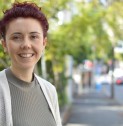
Media release | Unique study uncovers barriers to cervical screening for Indigenous women
Aboriginal and Torres Strait Islander women’s voices are at the center of a new study in to barriers to Australia’s cervical screening program.
-
The answer to Indigenous vulnerability to coronavirus: a more equitable public health agenda
Indigenous peoples over 50 have been directed to self-isolate, while for non-Indigenous people the age cut-off is 70. This is a reminder of the ongoing crisis of Indigenous health.
-
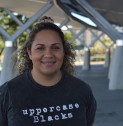
Dr Lisa Whop - The answer to Indigenous vulnerability to COVID-19
Dr Lisa Whop a senior research fellow at Menzies has collaborated with Dr Chelsea Bond a senior research fellow at the University of Queensland's School of Social Science to provide a thought provoking article addressing Indigenous vulnerability to...
-
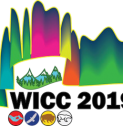
Media Release | THE 2nd WORLD INDIGENOUS CANCER CONFERENCE
Indigenous communities, consumers and health experts from around the world have come together at the opening of the second World Indigenous Cancer Conference (WICC) at the Calgary Telus Convention Centre in Canada.
-
Menzies researcher endorses United Nations Statement
Dr Lisa Whop, Senior Research Fellow at the Menzies School of Health Research, Australia, endorsed the statement, calling for a sustained active commitment from the highest level of government to end this disparity.
-
When numbers and stories collide – the fight for Aboriginal and Torres Strait Islander women.
In 2018 my team hit the road to yarn with Aboriginal and Torres Strait Islander women who participate or never/rarely participate in cervical screening.
-
Indigenous HPV vaccination rates “to be celebrated”
Dr Whop said that with the introduction of the HPV vaccine, Australia was on track to be the first country in the world to eliminate cervical cancer.
-

HPV champion and childhood blindness researcher honoured
Menzies' Dr Lisa Whop received the NHMRC Rising Star Award last night.
-

NITV: Two months' could be key to Indigenous women's survival of cervical cancer
NITV : A study lead by a young Torres Strait Islander research fellow finds that Indigenous women are not receiving the recommended 2-month clinical follow up on an abnormal pap test result.
-

Women missing timely Pap follow-up
BOTH Indigenous and non-Indigenous Queensland women may have missed out on timely follow-up for abnormal Pap test results over a decade.
-

MJA Videos 2017 Episode 5
Dr Lisa Whop, cervical cancer in Indigenous women
-

The Lowitja Institute Aboriginal and Torres Strait Islander Student Award 2016

.jpg&w=214&h=285)


